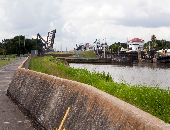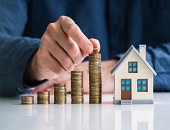Tax or Cap?
Carbon tax or cap and trade? These are terms bandied about in the political arena as countries decide how to address global warming. “There is a clear consensus among economists,” said Roger Gordon, professor of economics at University of California at San Diego, “that the best way to address global warming is through the global use of a carbon tax on CO2 emissions.” On January 18, 2024, he was speaking at a webinar as part of the biweekly series of talks, titled the Virtual Seminar on Climate Economics, sponsored by the Federal Reserve Bank of San Francisco (FRBSF). “With a carbon tax,” […]
Resilient earth?
As 2023 draws to a close, we see increasingly severe climate outcomes around the world—from rising emissions to severe weather events, to increased food and water inequality. Three days before the United Nations Climate Change Conference COP 28 began, a multidisciplinary research organization welcomed scientific panellists to a webinar for an audience of hundreds on November 27, 2023, titled “Nurturing a Resilient Earth.” The virtual event, sponsored by CIFAR (Canadian Institute for Advanced Research), convened an interdisciplinary panel of four top researchers. The discussion was moderated by Stephen Toope, President & CEO of CIFAR, and the author most recently of A […]
Flood Economics
When it comes to natural disasters such as flooding, does it make more economic sense to control the flood? Or to sit back, suffer the consequences, and count on insurance? Climate change leads to more frequent and more intense flooding. As these risks intensify, public funds will often be used to protect communities. Recent work done by economists estimates the amount and distribution of benefits from a major form of public flood risk adaptation, flood control levees. A levee is an embankment built to prevent the overflow of a river. The efficiency and equity implications of levees were investigated by […]
The Greenium
Does the average household want to invest in climate-friendly assets? If so, what proportion of assets are earmarked for green investments? What kinds of assets (equity or fixed income) are preferred? “Green investments are popular, but only about one-third of German households have some kind of green account,” said Monika Piazzesi, Professor of Economics at Stanford University. She was speaking at a webinar titled “Household Climate Finance: Theory and Survey Data on Safe and Risky Green Assets,” held on September 7, 2023, as part of the Virtual Seminar on Climate Economics sponsored by the Federal Reserve Bank of San Francisco (FRBSF). Her […]
Shelter Inflation
The welcome news this summer is that the overall rate of inflation is easing up, both in the U.S., where it has dropped to its lowest level in over two years, and to a lesser extent, in Canada, where in July, Canada’s inflation rate fell to 2.8 percent. Gasoline is pulling the inflation rate down, while food and mortgages were pushing it up. How has the U.S. housing market responded to the rise in interest rates? How do recent trends in the cost of house prices and rents affect the likelihood of future shelter inflation? “Various market indicators, including house […]
Heat Lowers the GDP
Every season, but particularly summer, reminds us that global warming is occurring at an alarming rate. The average global temperature will continue to rise over time if people do not take substantial action to reduce greenhouse gases, especially carbon emissions. What effect will soaring temperatures have on economic productivity? How will warming effects be distributed over the globe? Will these have a long-lasting effect on the GDP? Recent research by economists at the Federal Reserve Bank of San Francisco (FRBSF) delves into these questions. “Our findings show that total global losses in output per person could be substantial,” say the […]
Heated Exchange
Climate-related natural disasters are increasing in frequency and severity and costs. Since climate change is not equal across countries, how does a country’s exchange rate respond to such shocks? Furthermore, is it possible to build an economic model to predict future changes? On April 6, 2023, Galina Hale, professor of economics at the University of California at Santa Cruz, delivered a webinar about the effect of climate change on exchange rates. This was part of the series of talks sponsored by the Federal Reserve Bank of San Francisco (FRBSF), titled the Virtual Seminar on Climate Economics. She reported results from […]
Disruptions, Costs & Markets
The Covid-19 pandemic has caused supply chain disruptions. How much have the costs of international trade increased? What impact has this had on the U.S. economy? What is the effect on labor force participation? Can existing models properly quantify these effects? Recent research by three leading economists tried to model the real-life situation of U.S. dependence on a global supply chain and what happened when parts of that chain were broken. (“Broken” encompasses several scenarios: “ports being closed or operating at partial capacity, fewer workers being available for health reasons, and a shortage of shipping containers, among other challenges.”) On […]
Tools to Fight Global Warming
Investors realize something must be done to mitigate global warming. The financial system needs reliable tools, or performance indicators, that can measure how well financial portfolios align with the Paris Agreement goals. But what, exactly, are these indicators? On April 26, 2022, two specialists described the technical side of measuring portfolio alignment with current efforts to combat climate change. The webinar was sponsored by the Global Association of Risk Professionals (GARP) and was moderated by Jo Paisley, President, GARP Risk Institute. The movement toward portfolio alignment tools (PAT) is an outgrowth from the 26th United Nations Climate Change conference, commonly referred to as COP […]
Climate Risk Assessment
Storms, floods, fires, drought: what are the potential hazards threatening the physical assets of different regions? Furthermore, how can we estimate the magnitude of physical risk of each of these under a climate change scenario? “We’ve built infrastructure for certain weather patterns,” said Rohan Hamden, “but now it no longer fits with the weather we are experiencing.” Hamden is the founder and CEO of XDI, the Cross-Dependency Initiative, a company focused on Cross Dependency Analytics to estimate the physical risk to assets of many kinds of hazards. He was invited to share his expertise in physical risk data, modeling, and […]










